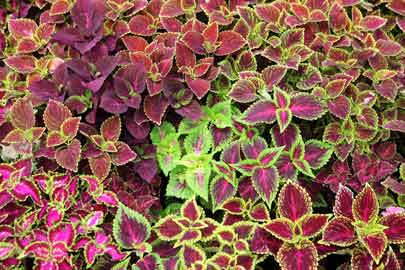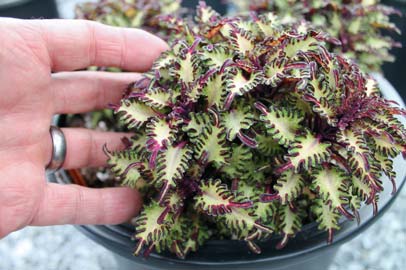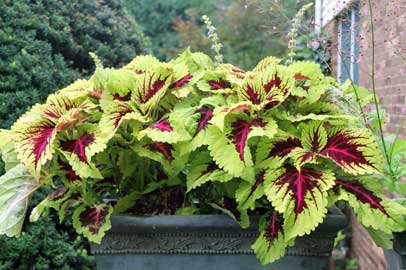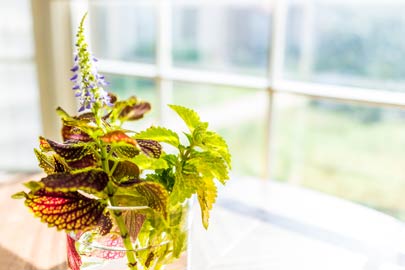 Coleus, also called, painted nettles, are available in a variety of brilliant colors.
Coleus, also called, painted nettles, are available in a variety of brilliant colors.
iStock/Thinkstock
Coleus originally were foot-tall, red-and-gold-leafed plants that came in just a few varieties and were mainly used as summer shade plants. Then came a wave of breeding that turned this average annual into a dazzling, diverse lineup of container stars.
Few plants offer the brilliant colors of coleus leaves. The range now runs from soft pink- and rose-tinted varieties to warm rusts and burgundy to neon-gold options that virtually glow.
Although coleus are most often used in pots, they also grow well in the ground. Most newer varieties perform as well in the sun as in shade, including dry shade and root competition under trees.
 Sea Monkey Purple is one of the new miniature coleus varieties in Hort Couture’s Under the Sea® line of coleus.
Sea Monkey Purple is one of the new miniature coleus varieties in Hort Couture’s Under the Sea® line of coleus.
George Weigel
Sizes and forms include fingernail-sized miniatures that grow only 6 inches tall, trailers that spill lushly from hanging baskets, and bushy 3-footers that make ideal centerpieces in large pots.
Growing Coleus
 Coleus Kong® 'Rose' offers exceptionally big leaves in addition to its rose, burgundy and chartreuse blend of leaf color.
Coleus Kong® 'Rose' offers exceptionally big leaves in addition to its rose, burgundy and chartreuse blend of leaf color.
George Weigel
In pots, keep the soil consistently damp, fertilize monthly with a granular plant fertilizer, and don’t be afraid to snip off any overly rangy shoots.
 Coleus cuttings are easily rooted in water.
Coleus cuttings are easily rooted in water.
iStock/Thinkstock
Are you interested in getting your coleus to multiply or do you want to share your plant with a friend? Coleus are super easy to root in water. Simply snip off the stem top with a few leaves and drop the stem into a glass of water on a sunny window sill. Be sure to change the water every few days. You should have roots within 1-2 weeks.
In the ground, work an inch or two of compost into the soil before planting, fertilize every six weeks with a granular plant fertilizer, and soak the bed when the soil goes dry.
Coleus die with frost each fall, but are actually perennials in frost-free climates of Zone 10 and warmer.